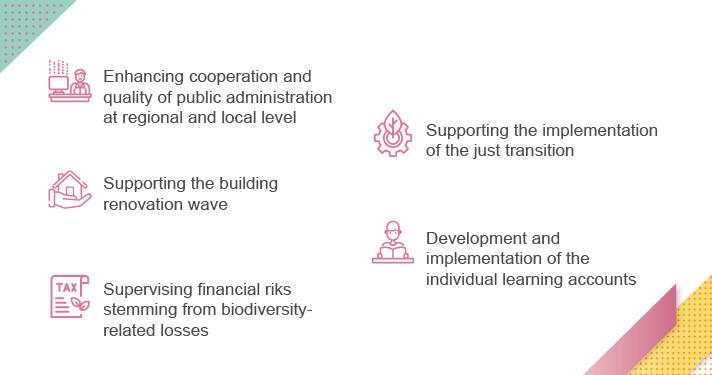The Technical Support Instrument (TSI) is the EU programme that provides tailor-made technical expertise to EU Member States to design and to implement reforms at the national level, with an emphasis on the green and digital transitions. The TSI also supports the preparation and implementation of Recovery and Resilience Plans. TSI 2022 main novelties are the multi-country projects, geared at addressing common issues among Member States thereby underlying the EU added-value of the instrument, and the "Flagship" projects, supporting reforms which are largely needed across Member States and are in line with the EU priorities.
Initiated in 2021, the TSI is the successor of the Structural Reform Support Programme (SRSP). Since 2017, both programmes have helped design, develop and implement over 1500 reform projects in 27 Member States.
6 NEW PROJECTS SELECTED UNDER TSI 2022
With the second round of the TSI, the Commission will support Hungary with 6 projects in the areas of supporting the implementation of the Just Transition, renovation wave, local government public finance reform, developing and implementing individual learning accounts, supervising financial risks stemming from biodiversity losses and improving insurance conduct supervision.
Examples of new projects adopted include:
28 COMPLETED AND ONGOING REFORM PROJECTS
Hungary has so far benefited from 28 projects financed by the TSI or its predecessor, the Structural Reform Support Programme (SRSP). This support has addressed a broad range of policy areas, including green transition and circular economy, productivity of the SME sector, access to finance, primary healthcare and higher education.
To date, 12 projects have been successfully concluded.

The European Commission supported Hungary in implementing the National Climate Change Strategy, with a focus on analysing and integrating best monitoring and evaluation practices.

The European Commission supported Hungary in better addressing the employment gender gap. The programme supported an analysis to the legislation, existing policies and to the drivers for low participation of women in the labour market.

The European Commission supports Hungary in strengthening the administrative capacity of the Ministry of Finance and National Tax and Customs Administration to identify, detect and effectively handle dispute cases of aggressive tax planning.


